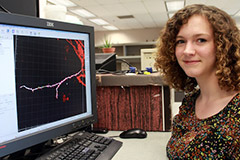Mentoring: a gratifying experience for all involved
In Homer's Odyssey, Odysseus leaves Ithaca to fight in the Trojan War, entrusting his friend, Mentor, with guiding his young son, Telemachus. We now think of a mentor as one who teaches and helps a less experienced, often younger person. At Sunnybrook Research Institute (SRI), scientists teach and advise their staff, students and fellows. Their lab members, in turn, show younger students—most of who have never worked in research—the ins and outs of their particular group.
Mentoring can be rewarding for everyone involved. "Summers in [our] lab are busy, but a ton of fun. There is a lot of excitement, which comes from students who are getting their first real taste of research. The excitement and enthusiasm spreads throughout all the members of the lab," says Dr. Alison Burgess, a research associate in the lab of Dr. Kullervo Hynynen, director of Physical Sciences at SRI. Burgess helped supervise Shonara Gibson, a third-year student at Dalhousie University, who was one of 35 summer students working in Hynynen's lab. Burgess oversaw Gibson's project, which looked at the effects of focused ultrasound on the brain. Here, they give Alisa Kim different perspectives on mentoring in one of SRI's busiest labs.
The focused ultrasound lab is a hub of activity in the summer. What's the biggest challenge working in this environment?
Shonara: Getting oriented with your project and your place in the lab as a whole, is a bit challenging. There are so many people working on so many projects, [and] I wanted to know who was working with whom, on what. As a biology student, trying to understand a fraction of all the physics terminology flying around the lab took some getting used to. Alison did a really good job of covering the basics that were relevant to me.
Alison: Most students have never been part of a research project before, so as a supervisor, I spend a lot of time in the first week trying to put their research project in context. As well, I try and book time to train students properly on equipment they are using and give them lots of resources to read and prepare for their summer.
What did you cover during your meetings?
Alison: I met with Shonara a lot during her first few weeks as she trained to do staining and use the confocal microscope. I was lucky because Shonara was very motivated and independent. As time went on, we spent the meeting time delving into details: how much progress had she made? Was she experiencing any problems? Did she have any questions? I also asked a few questions to encourage her to think about the context of the project and where the research should go in the future. At one point in the summer when the equipment was not working, Shonara spent some time reading literature to come up with the next steps of the project after she was gone. She did a great job.
What was the trickiest thing to learn?
Shonara: The [image] analysis programs we used were completely new to me, so learning how to use Imaris accurately was the most challenging, especially because the program can be greatly changed by user inputs. A change in threshold values can change your results, and as much as I tried to keep the same standard parameters, at times it was difficult to definitively establish how high or low to set threshold values.
Alison: I think the trickiest thing to learn was how to analyze the data at the end of the summer to determine what the outcomes were. Shonara hasn't taken statistics yet, so we spent a lot of time together going through the data and determining which statistics test was appropriate.
Were you surprised at how much progress was made?
Shonara: Yes. I didn't realize how much data I had collected until I looked at my spreadsheets.
Alison: Yes! Shonara gathered so much data that I am still finishing the analysis! She worked really hard, and we are hoping to put together a publication soon so she is rewarded for her tremendous effort.
What did you gain from the experience?
Shonara: I got to see what it was like to work in a lab. I learned how to plan to work to a deadline and how to improve experimental techniques. I met an incredible bunch of people with different skills, goals, and outlooks, and it broadened my understanding of just how much there is to discover in science.
Alison: Shonara was a great student in the lab. She is bright and independent, so she didn't require much supervision from me. As a supervisor, I learned to 'let go' a little and trust her to work independently.





